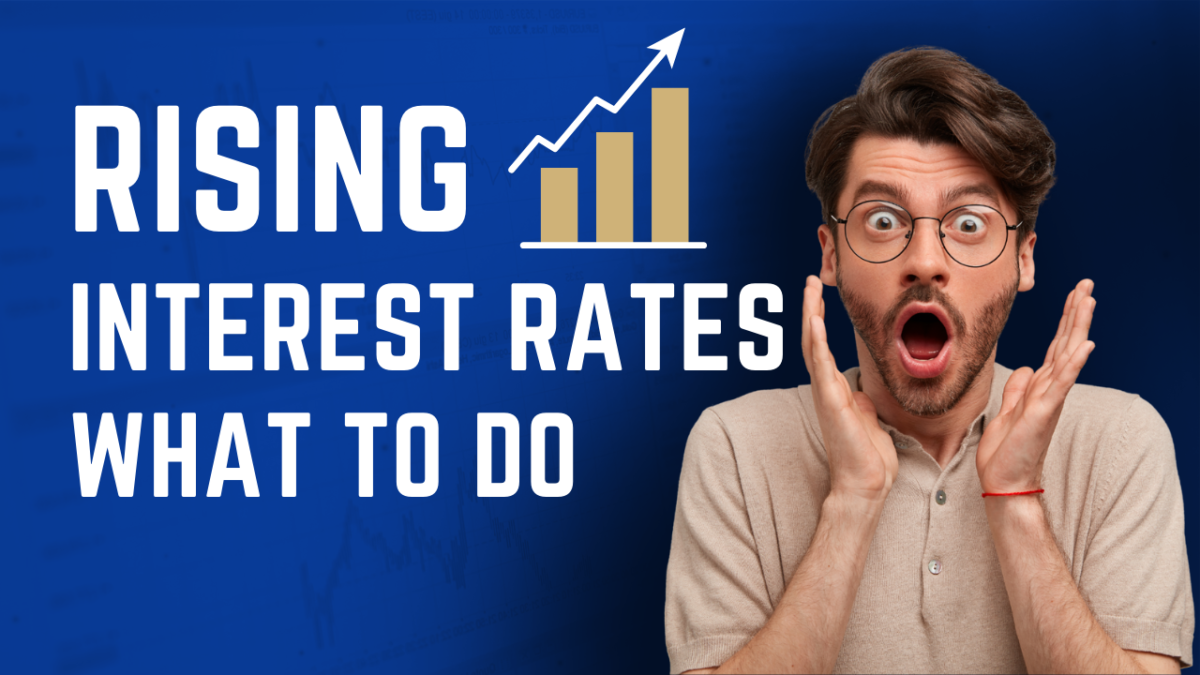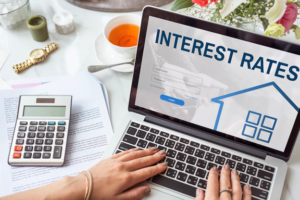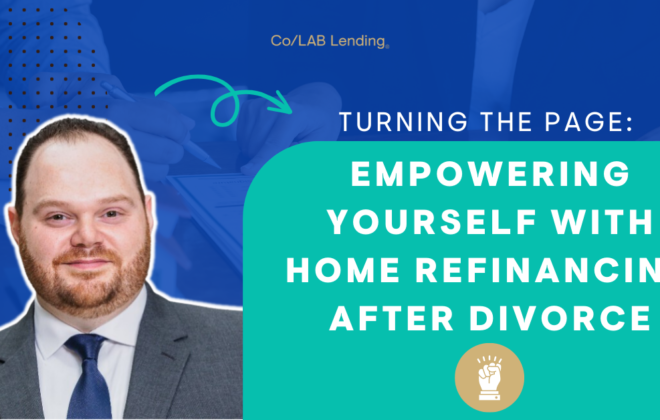Navigating 2023’s Rising Interest Rates: A Guide for Home Buyers
.
Rising interest rates are putting financial pressure on would-be homeowners. While home prices have begun to drop, they are still very close to their all-time high. Many people may have to reevaluate their financial plans as a result of it.
When interest rates rise, it becomes more challenging to buy or sell a property, and when they fall, it becomes less of a challenge to do either. However, in this article, we will talk about what you should do as a home buyer in times as there when the interest rate is rising at no bounds!
Understanding the Impact of Delaying the Home Buying Process
Interest rates change over time, sometimes substantially! If you delay purchasing a house, they may fall in the future, making the property you want more accessible – or they may be higher, making the house you want even more out of reach.
The dilemma for homebuyers is, whether it makes sense to wait and hope. The solution is never as transparent as a crystal ball.
House ownership offers perks that renting does not. Renting means you have no control over the future as the home price or interest rate increases. Waiting to purchase in the hopes that interest rate would decline is to forego homeownership advantages.
It is advisable to take advantage of the current interest rate and develop equity as quickly as possible.
Strategies to Counteract Rising Interest Rates
Mortgage payments and the minimum income needed to qualify for a loan both rise in tandem with a rise in interest rates. Therefore, it is in your best interest to take the following measures to make things easier for you.
Buy down your rate with points
You may get a better interest rate on your mortgage by paying discount points up ahead. An additional discount point will add 1% to your loan.
It is common practice for one discount point to reduce a borrower’s interest rate by 25 basis points (0.25%), which would result in a savings of $3,000 on a $300,000 loan.
The Role of ARM Loans in Rising Interest Rates
Some customers switch to Adjustable-Rate Mortgages (ARMs) when fixed-rate loans become too expensive.
The interest rate on an Adjustable-Rate Mortgage (ARM) from many lenders is fixed for an introductory period of time, usually the first three, five, seven, or ten years of a 30-year loan.
The interest on a mortgage loan with a teaser rate is often lower than the rate on a conventional loan with a fixed interest rate.
The interest rates on Adjustable-Rate Mortgages (ARM) may change depending on the margin and index specified in the loan agreement. ARMs are a good option if you want to move out of your house within a few years or if you want a reduced monthly payment.
Payout increases are capped annually and permanently. Don’t get locked in an ARM that won’t let you refinance without paying a charge. Pay attention to any prepayment penalties before agreeing to an ARM!
The Benefits of Shorter Term Loans in a Rising Interest Rate Scenario
Mortgage loans with lengths of 15 or 20 years are available from a variety of lenders. The interest rate on a 15-year loan is typically 0.5 percentage points to 0.7 percentage points cheaper.
You may save money on interest and increase your home equity quicker if you choose a short-term loan. Consequently, you’ll save a ton of money on interest payments as compared to a long-term period.
However, it’s important to remember that the monthly payments on a short term loan are much greater. This is due to the fact that the same loan amount may now be repaid in half the time. So, before agreeing to this kind of loan, be sure you can easily afford the monthly installments.
Increase your initial investment
If you make a higher down payment, you may qualify for a better interest rate. This is because the lenders see you as less of a danger. A greater down payment will also reduce your interest expense and monthly payment.
To further sweeten the deal, Private Mortgage Insurance (PMI) premiums on traditional loans may be avoided with a 20% down payment.
Relocate to a less expensive area or rent out some of your property
Starting off with a less costly property as a way to test the tides and see whether buying is something you want to pursue. It doesn’t matter whether you buy a starter home or a fixer-upper since you can always sell it and get something bigger.
Alternatively, you might choose a bigger property and rent out a portion of your house to help pay your mortgage.
Change your loan type if you meet the requirements
If you’re eligible for the appropriate financing, you may obtain better interest rates. You need to shop around for the loan type that fits your profile the most! You may find fantastic offers among Conforming, FHA, VA, and USDA loans.
Loans insured by the Federal Housing Administration (FHA) tend to offer lower interest rates. This is for borrowers with average credit, whereas rates for conventional loans are lower for borrowers with excellent credit.
Only current service members, veterans, or surviving spouses of veterans are eligible for a VA loan. Additionally, USDA loans are restricted to homes located in rural regions.
FHA loans enable you to buy a two- to four-unit property with as little as 3.5% down payment. The rental income from those units may be used to meet the loan’s income requirements. But you have to make one of these apartments your main home for at least a year.
Conforming loans have less stringent residence criteria than VA and USDA loans. However, the standards for the two types of loans are essentially the same.
Compare lender options
Compare and contrast several loan providers and loan programs to get the best financing terms. The number of consumers looking to purchase or refinance has plummeted as a result of the increase in interest rates. Therefore, loan providers are more inclined to compete for your business.
It’s a good idea to receive price estimates from a few different types of lenders. Compare their offerings to discover who has the best prices and conditions. You may use this information to your advantage by negotiating a lower mortgage rate and/or reduced closing expenses.
Hire a mortgage broker
Working with a mortgage broker directly, as opposed to a bank or lender, might potentially get you a better rate.
Strengthen your credit rating
The easiest method to get the lowest possible mortgage rate is to be sure you qualify for it. This may be done by paying down your credit card and other debt and reviewing your 3 free credit reports.
Anything an application may do to lessen the risk to a lender will encourage him to provide the best choice.
Frequently Asked Questions About Rising Interest Rates
Is it true that my housing costs should not exceed 28 to 30 % of my income before taxes?
Many financial advisors advise keeping your mortgage payment within this range. However, this is only a stereotype. Depending on your particular conditions, you may need to allocate a substantially less portion of your monthly salary for housing to maintain financial stability.
Break down your monthly expenditures to accurately assess how much you’ll have to bend to finance the mortgage and if you can reduce unnecessary expenses.
How can I reduce my interest rate?
If you have additional cash on hand, you might inquire with your lender about the differences in your monthly premium if you make a larger down payment.
Typically, buying down the rate entails paying a point (a percentage of the mortgage amount) at closing to reduce the mortgage rate over the term of the loan. One point corresponds to one percent of the total loan amount.
The reduction in interest rates will rely on the lender’s proposal. Some lenders may also reduce the interest rate for the first year or two for a reduced charge.
What are the consequences if I purchase a home using funds from my retirement account?
The funds in your 401(k) may encourage you to make an early withdrawal or borrow against it. It is, however, advisable not to withdraw any funds from your retirement account. You may borrow money to purchase a home, but not to support your retirement!
In addition, there are severe tax penalties as well. If you make a withdrawal from your 401(k), you will be subject to a 10% penalty and income taxes. This is a lose-lose scenario! If you borrow because your property is unaffordable, you will also have to earn more to replenish your retirement funds.
Obtaining a loan against your 401(k) is somewhat preferable. There are no immediate penalties or tax ramifications. However, you will miss the long-term advantage of letting the money grow in value as it sits undisturbed.
In addition, you will have to pay taxes and a charge on the loan balance sum if you don’t return the loan soon enough or if you lose or quit your work before it’s paid in full.
Should I sell my stocks in order to purchase a home?
The use of non-retirement investment accounts to raise your down payment is better than dipping into retirement funds. However, there are tax considerations associated with selling stocks.
If you’ve had the stocks for a long time and have a capital gain, you’ll have to pay a tax. However, the capital-gains tax would likely be less than the income tax you would pay on a retirement plan.
Conclusion
Buying a home is a big life decision! Don’t give in trying to predict the market or interest rates, which frequently leads to disappointment. When the moment is appropriate for you to buy a house, buy a house! Don’t allow the news or peer pressure to affect your decision.
Instead, you should purchase a home when you can afford the monthly installments, regardless of the interest rate or price. If you are still having confusion, contact our team here at Co/LAB Lending.
Mortgage Consultation Today!
Tags In
Categories
- Credit (4)
- FHA Loans (3)
- Finances (3)
- First Time Home Buyers (6)
- Grab Bag (7)
- Home Technology (1)
- Homebuying Tips (17)
- Inspiration (1)
- Insurance (3)
- Interest Rates (3)
- Loan Process (1)
- Mortgage Financing (14)
- Motivation (1)
- News (1)
- Press Release (8)
- Renovation (2)
- Self Employed (1)
- Tips & tricks (1)
- Uncategorized (134)
- USDA Loans (1)
- VA Loans (2)






